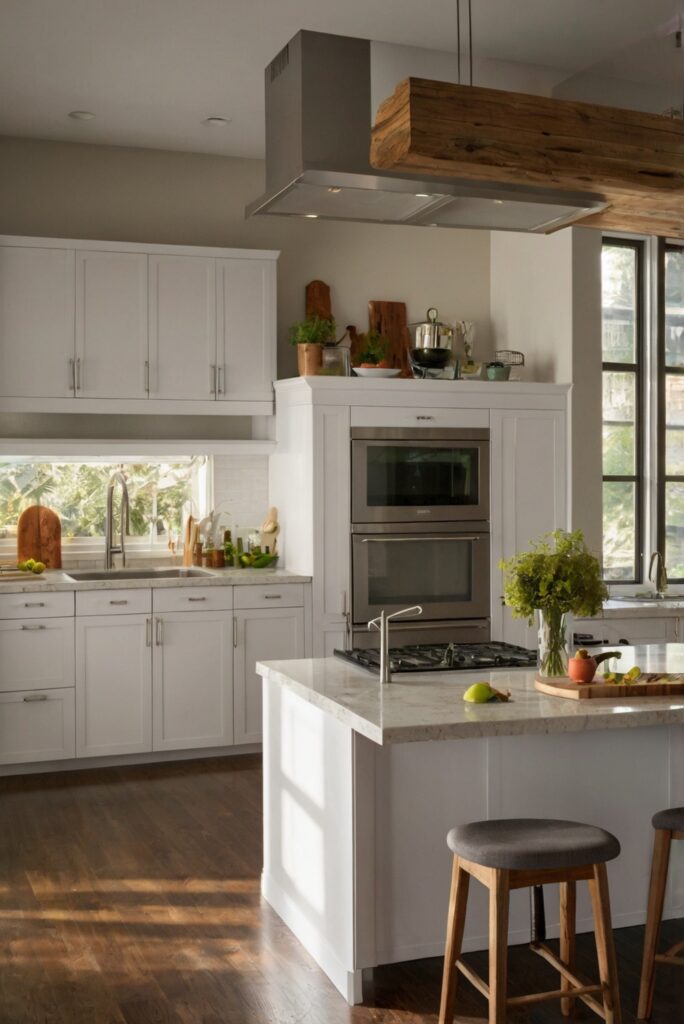Discover the top materials used for crafting eco-friendly kitchen cabinets in this insightful daily routine for interior designers. Explore sustainable options for a stylish and environmentally-conscious kitchen design.
Rubberwood, reclaimed wood, bamboo, and FSC-certified wood are some of the best materials for eco-friendly kitchen cabinets. These materials are sustainable, durable, and have low environmental impact. Rubberwood is a popular choice as it is a byproduct of the rubber industry and helps reduce waste. Reclaimed wood adds a rustic charm and is sourced from old furniture or buildings. Bamboo is fast-growing and renewable, making it an eco-friendly option. FSC-certified wood is sourced from responsibly managed forests. When choosing eco-friendly materials for kitchen cabinets, consider durability, maintenance, and design aesthetics. It’s important to research the benefits and risks of each material to make an informed decision. Proper space planning and interior design can help optimize the functionality and aesthetic appeal of the kitchen. Use eco-friendly primer and paint for walls to complete the sustainable kitchen design. Consider color matching painting for a cohesive look. Explore different paint colors to find the perfect match for your kitchen cabinets and walls. Designers can offer valuable advice on creating a sustainable and stylish kitchen space. Prioritize sustainable materials and practices for a home interior that promotes environmental responsibility and longevity.
What are the Best Materials for Eco-Friendly Kitchen Cabinets?
Choosing eco-friendly materials for kitchen cabinets is essential for reducing environmental impact and promoting sustainability. Here are some of the best materials to consider:
Bamboo:
Bamboo is a popular choice for eco-friendly kitchen cabinets due to its rapid growth rate and renewability. It is a sustainable alternative to traditional hardwoods and offers a sleek and modern look for your kitchen. Bamboo also has natural antibacterial properties, making it a hygienic option for cabinet construction.
Reclaimed Wood:
Using reclaimed wood for kitchen cabinets is a great way to reduce waste and give new life to old materials. Reclaimed wood adds a unique and rustic charm to your kitchen while also reducing the demand for newly harvested wood. Look for reclaimed wood from sources such as old barns, factories, or warehouses.
Recycled Materials:
Opting for kitchen cabinets made from recycled materials is a sustainable choice that helps divert waste from landfills. Materials like recycled glass, metal, or plastic can be used to create stylish and durable cabinet designs. Look for cabinets that are certified as being made from a high percentage of recycled content.
Strand Woven Bamboo:
Strand woven bamboo is a durable and eco-friendly material that is created by compressing bamboo fibers together under high pressure. This process results in a dense and hard material that is perfect for kitchen cabinets. Strand woven bamboo is resistant to moisture and scratches, making it a practical choice for a busy kitchen.
MDF (Medium-Density Fiberboard) with Low or No Formaldehyde:
MDF is a popular choice for kitchen cabinets due to its affordability and versatility. However, traditional MDF can contain formaldehyde, a harmful chemical that off-gasses over time. Look for MDF products that are certified as having low or no formaldehyde content to ensure a healthier indoor environment.
In conclusion, choosing eco-friendly materials for kitchen cabinets is not only beneficial for the environment but also for your health and well-being. By opting for sustainable materials like bamboo, reclaimed wood, and recycled materials, you can create a stylish and environmentally conscious kitchen that you can enjoy for years to come.
What are the Best Materials for Eco-Friendly Kitchen Cabinets?
When looking for eco-friendly kitchen cabinets, it’s important to consider materials that are sustainable, non-toxic, and durable. Here are five popular questions related to this topic:
1. Why is sustainability important in choosing materials for kitchen cabinets?
Sustainability is crucial as it ensures that the materials used are sourced responsibly without causing harm to the environment. Opting for sustainable materials helps in reducing deforestation and minimizes the carbon footprint associated with the production of cabinets.
2. What are some eco-friendly materials commonly used for kitchen cabinets?
Bamboo, recycled wood, reclaimed wood, and FSC-certified wood are popular choices for eco-friendly kitchen cabinets. These materials are renewable, toxin-free, and contribute to a healthier indoor environment.
3. How can I ensure the eco-friendliness of the materials used in kitchen cabinets?
To ensure the eco-friendliness of the materials, look for certifications such as Forest Stewardship Council (FSC) certification, which guarantees that the wood used comes from responsibly managed forests. Additionally, choose materials that are low in VOCs (volatile organic compounds) to reduce indoor air pollution.
4. Are there any innovative eco-friendly materials emerging in the market for kitchen cabinets?
Some innovative eco-friendly materials gaining popularity include recycled glass countertops, wheatboard cabinets, and eco-friendly laminates made from recycled materials. These materials offer sustainable alternatives to traditional cabinet materials without compromising on quality.
5. What are some sustainable practices to consider when installing eco-friendly kitchen cabinets?
When installing eco-friendly kitchen cabinets, consider energy-efficient lighting, water-saving fixtures, and proper waste management during the renovation process. Opt for locally sourced materials to reduce transportation emissions and support local economies, further enhancing the sustainability of your kitchen renovation project.

